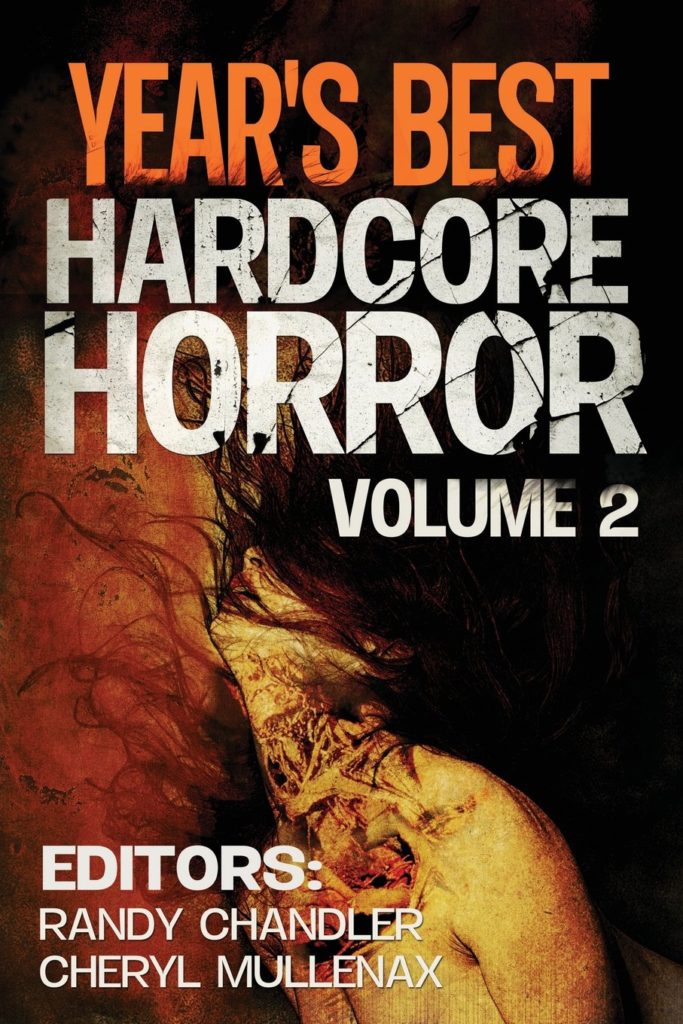My story “Grandfather’s Room” appears in the post-apocalyptic horror anthology, Down with the Fallen, edited by Jordon Greene and available Nov. 7 from Franklin/Kerr Press. Click here to order. To read an excerpt, click here.
Video review
Kept Boy (2017)
Unrated
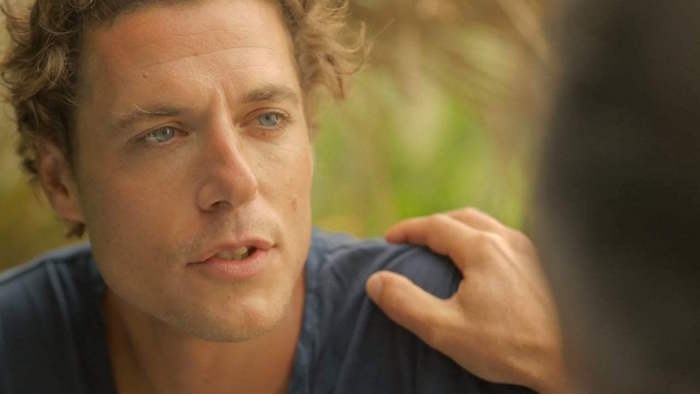
Breaking Glass Pictures
Kept Boy steadily endeared me to its character as it rolled along. The gay romantic comedy is definitely funny, and its breezy pace kept me involved despite my initial reservations with the clichéd characters: the rich, aging sugar daddy; his buff mindless kept man-child; his brash male housekeeper; and the new stud who lobs himself into the mix like a live grenade.
Out now on DVD and VOD, the film, director by George Bamber (a veteran assistant director, moving to the big chair here), won me over despite its expected love triangle; it gets a mighty lift from humor and his actors.
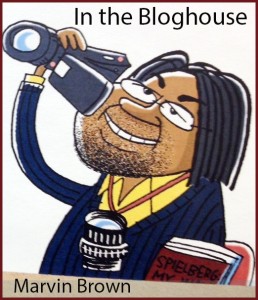 We meet Farleigh (Thure Riefenstein) and Dennis (Jon Paul Phillips) during what must be a routine house party. We sense they’ve been living this way for years: the swimming pool fetes, limitless bottle of wine and champagne, flashy name-dropping guests. The men seem tired, disconnected, and suspicious that something’s changing between them.
We meet Farleigh (Thure Riefenstein) and Dennis (Jon Paul Phillips) during what must be a routine house party. We sense they’ve been living this way for years: the swimming pool fetes, limitless bottle of wine and champagne, flashy name-dropping guests. The men seem tired, disconnected, and suspicious that something’s changing between them.
Farleigh is the celebrity breadwinner, the aging host of a once-popular home-design reality TV show. In his tailored suits, deliberate speech and accoutrements of importance, Farleigh plays his role of parent/husband/alpha male in a house of flighty men. Dennis is the kept boy of the title, having long been faithful in his role of eye candy companion (his skills are working out and pouring drinks). Not to be forgotten is Javi, the multiple hyphened helpmate who, Dennis learns belatedly, was the previous kept boy. Javi (Deosick Burney) could be the stereotypical funny black guy, but the script gives Java a couple of nice scenes to discuss his role in Farleigh’s life and Burney elevates the character.
How long was this makeshift family going to last? Fading youth and stagnant routine have a way pecking at longtime lovers, doesn’t it? When Farleigh urges Dennis to get a job and announces he’s selling the Porsche (ostensibly Dennis’ car) Dennis draws out of his lover that their halcyon days may be waning. Farleigh’s carrying massive debt and his ratings-challenge TV show appears to be in its final season.
More troubling to Dennis, who’s completely without job skills, is Farleigh’s interest in the younger, handsome Jasper (Greg Audino), Farleigh’s pool boy turned sudden assistant for the TV show.
Farleigh and Jasper seem to flirt in plain sight, which Dennis absorbs with brutal dignity. But Dennis is not without weapons in this battle. He knows Farleigh’s weak spots and can intuit his sugar daddy’s reactions like nobody’s business.
The film grows interesting because Farleigh, Dennis and Jasper are as self-aware of their roles as we are. Farleigh and Dennis each seem to realize what they had for years is coming to an end—or a transition neither wants to face. They’re playing their roles, but also preparing for life without each other. Beefcake Jasper, more calculating than we initially expect, has sincere motivations. The lovers’ triangle is put through its sexual paces; each combination gets a shot at getting busy.
Bamber’s film has a couple of surprises up its sleeve. A getaway island trip—make or break, as far as Dennis is concerned—teeters fascinatingly between slapstick and drama, culminating in abrupt violence and gunplay. A sweet, quiet, honest long-in-the-coming discussion between Farleigh and Dennis ends with a turn that deepens the proceedings. The island drama notwithstanding, much of the film flows by on strong currents of humor, aided by the likability of the characters. Speaking of likable characters, let’s give shout-outs to Dennis’ lonely-hearts kept-mates, Lonnie (John-Michael Carlton) and Paulette (Toni Romano-Cohen): he, hanging on to his rich-widow sourpuss; she, bemoaning her lot as an aging trophy-gal. The trio slurps mixed drinks in various lounges while strategizing—with well-timed, hilarious dialogue—their next moves as the users who have become the used.
Dennis, most importantly, takes on unexpected dimensions from Phillips’ assured performance, and final scenes between he and Javi, then he and Jasper, really feel authentic, taking the film farther away than expected from its opening scenes of debauched cliché.

| Marvin Brown’s Movie Review Archive
Excited that my story “Grandfather’s Room” was selected for the upcoming post-apocalyptic horror anthology, Down with the Fallen, from Franklin/Kerr Press.
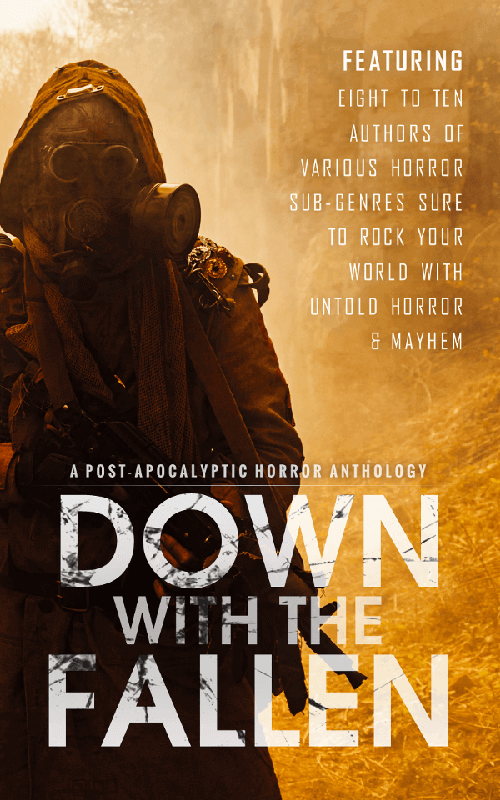
The Year’s Best Hardcore Horror Volume 2 is out now! The anthology, edited by Randy Chandler and Cheryl Mullenax from Comet Press, includes my short story “The Field.” Get your copy NOW!
AWARD-WINNING DIRECTOR ELINA PSYKOU TELLS UNIQUE STORIES
There’s a clear-eyed focus concerning Elina Psykou filmmaking outlook. Yes, she a female director—underrepresented, lauded—and as a Greek director she’s gaining ground on her auteurs peers like legends Theo Angelopoulos and Costa-Gavras, and rising-star Yorgos Lanthimos (Dogtooth and The Lobster). But she seems less interested in being analyzed as a female or Greek director than telling insightful stories not confined to one country or nationality; she’s busy honing her craft.
When making films, Psykou says, “I prefer not see everything as black or white. Everything depends on the point of view.”
Her latest film, Son of Sofia, had its U.S. debut in April at the Tribeca Film Festival, where it received the prize for the Best International Narrative Feature. Her sophomore effort is set in 2004, but its clash of Russian and Greek cultures seems acutely timely as current immigration issues provide searing headlines around the globe.
CHECK OUT MY REVIEW OF THE FILM HERE
Son of Sofia is the tale of 11-year-old Misha, a Russian boy who arrives in Athens during the 2004 Olympics in Greece. Two years prior, his mother relocated to the country following the death of her husband and now Misha joins her. There reunion, to say the least, is awkward. Attempts by mother and son to reconnect are hindered by bitterness, deception and culture clash. Misha’s faced with many changes, including gaining an unexpected stepfather.
To hear Psykou talk is to hear her appreciation for cultural variety.
“It makes no difference wherever you are from,” she says. There’s a commonality in our yearning, our fears. Whether it’s a Russian kid or Greek kid. “When you are a kid you are the same,” she says.
Psykou is an alchemist of sorts: she mixes Greek sensibilities in with Russian folklore, then stirs in a bit of dry humor, social commentary and suspense.
Particularly, it’s the fantasy elements that subtly, then boldly run through the film. “I believe kids love fantasy,” she said. So it made sense that Misha turns to fantasy in the face of his confusion. It is a way for the quiet, isolated boy to give voice to his fears and anger. But, Psykou notes, Misha isn’t the only character who looks to fantasy. Each of the main character—Misha, his mother and his new stepfather—use some level of fantasy to cope.
“The film is an opportunity to explore fantasy,” Psykou says. “The three main fantasy scenes in the film all occur during turning points in the film.”
Like her awarding-winning “New Wave” first film, 2013’s The Eternal Return of Antonis Paraskevas, Son of Sofia invests in clever observation, off-beat characters and deliberate pacing. Son builds upon Psykou’s eye for detail and steadicam work and her abilities to mesh the surreal and the concrete.
She finds influence in Austrian auteur Michael Haneke (Funny Games, Amour) and American indie great Sofia Coppola (The Virgin Suicides, Marie Antoinette). Haneke’s cold, creepy intellect is evident, and so is Coppola’s doggedly atonal uniqueness.
What’s next for the talent director? A planned documentary that features people who travel to other countries to receive services—abortion, cremation—not available to them in their native lands. A third film will follow the documentary.
It’s all about staying focused on her craft. Ultimately, Psykou wants to be in a position to create films on a regular basis.
“I’d like to make films every three years,” she says.
| Marvin Brown’s Movie Review Archive
Tribeca Film Festival
Son of Sofia (2017)
Unrated
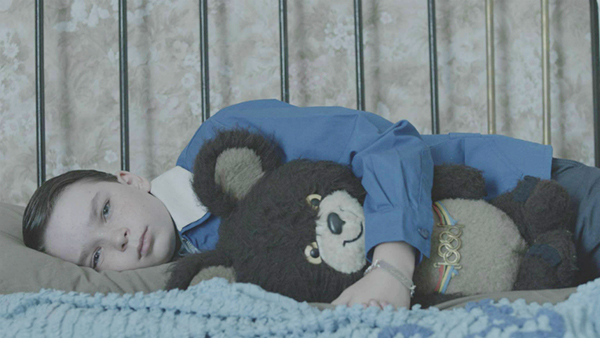
Steficon SA
The little Russian boy is grief-stricken, seemingly abandoned, deceived and brought to a country whose language and people he doesn’t understand. It’s not surprising that he gradually retreats into fantasy, which is at first cute, then grows disturbing and possibly dangerous.
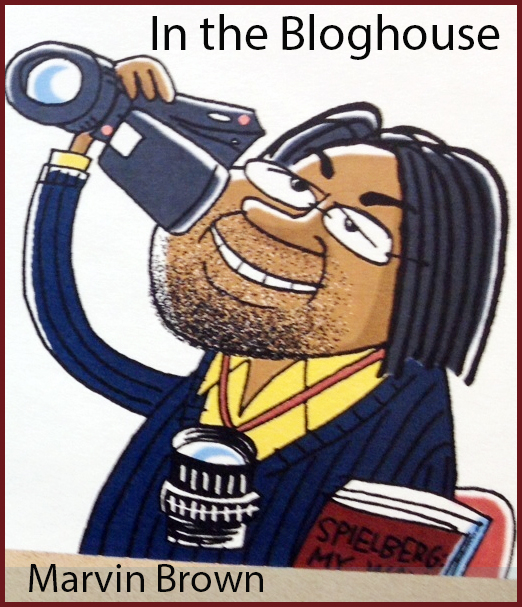 Writer-director Elina Psykou (The Eternal Return of Antonis Paraskevas, 2013) sets her sophomore film during the 2004 Olympic Games in Greece, a time of clashing cultures, and of civic pride and competition.
Writer-director Elina Psykou (The Eternal Return of Antonis Paraskevas, 2013) sets her sophomore film during the 2004 Olympic Games in Greece, a time of clashing cultures, and of civic pride and competition.
Misha (Viktor Khomut) arrives with the Russia Olympic team to Athens and reunites with his mother Sofia (Valery Tcheplanowa), who has been settled in Greece for more than two years. Details of their separation are vague, but involve the death of Misha’s father and his mother establishing residency to provide for herself and her son. It’s an awkward reunion. Sofia seems to be trying to muster up joy with forced affection and a ridiculously large stuffed animal in tow. Misha immediately regards her tightly rolled-up hairstyle as foreign. He tells her his mother wears her long, beautiful hair down.
READ MY INTERVIEW WITH DIRECTOR ELINA PSYKOU
Things get more awkward as 11-year-old Misha learns he shares his new home with an elderly Greek man, Mr. Nikos (Thanasis Papageorgiou), who Misha is lead to believe is in the care of his mother. Mr. Nikos doesn’t speak Russian and doesn’t want it spoken in the home. Quickly, of course, Sofia’s deception is foiled. Misha discovers her sleeping in the same bed as Mr. Nikos. By the time Sofia belatedly confesses to being married to the man, an irate Misha has sealed himself in the bathroom. To be sure, Sofia has also kept Mr. Nikos in the dark, leading her husband to believe Misha was informed of gaining a stepfather.
The entire film seems populated by characters trapped within themselves, despite being surrounded by colorful culture and an influx of immigrants and opportunities. It’s a sad, quiet tale of people unable to make connections beneath the surface, which inevitably reinforces fantasy and delusions. Misha, often cloaked in a bear costume, finds strength and aggression in his imaginary world filled with moving, growling stuffed animals; the self-important Mr. Nikos longs again for the magical era when he possessed fame; Sofia seems adrift in the space between a past happy life in Russia and this makeshift family in Greece. A quiet scene of the family eating together while watching television hints at a domesticity that will never be.
Psykou’s film is filled with characters you don’t know whether to like or dislike. Sofia seems disconnected as a mother, sneaky and deceptive in ways that seem unnecessary. She leaves Mr. Nikos to do much of the caretaking while she’s away working at a textile company, making stuffed animals. In addition to deceiving her son about being married, she also lies about watching a beloved TV series Misha intended to watch with her, and for good measure keeps a secret stash of candy hidden in the toilet tank. She seems unhappy at her job and in her roles as a parent and a wife.
Mr. Nikos, a former host of a once-popular children’s television show, initially seems controlling and lost in his arrogance. Portraits of himself adorn the walls of his home. His insistence on having only Greek spoken in a household where two-thirds of the occupants are Russian seems selfish, and yet understandable. While he is a man of pride, he also wants to leave a legacy. Late in the film, when he shares his secret room of memorabilia with Misha, Mr. Nikos comes alive and Psykou effectively captures the feel of a bygone time and place. Mr. Nikos becomes as much of a dreamer as Misha.
But the film exists in reality even when the characters don’t. Misha meets Victor, a sixteen-year-old emigre from Russia who immediately takes to the boy. At first Victor seems to be a welcomed friend for a boy whose mother is disengaged and whose stepfather is completely out of step with Misha. Victor takes the boy shopping, to the park and surrounds him with other youths. Unfortunately, Victor also shoplifts, offers lousy advice and engages in a highly disturbingly activity. Psykou presents Victor so matter-of-factly it shocks us when we get the full measure of the character.
Finally, there’s Misha. Wonderful portrayed by Khomut. We feel trapped with the boy thrown into a life he can’t bear, unable to find any external means—language, environment, friendship—to express himself so he turns inward. His actions late in the film, after Mr. Nikos suffers a setback, unnerves as we wonder if fantasy will save or corrupt the boy.
The film will challenge American audiences needing things tied up in a bow and directly spelled out. It’s a delicate balance that Psykou achieves: characters that intrigue us but we can’t say we like them, somber and raw scenes colliding with fantasy, an enticing mixture of Russia and Greek cultures. Her film is a sonic wonder, with animal sounds creeping onto the soundtrack in unexpected, subtle ways. Ands it often seems to be lit naturally, shot simply, harkening back to the Dogme 95 movement. Its deliberate pacing keeps us on edge, waiting for a shoe to drop, seemingly influenced by director Michael Haneke. Its denouement, a fusion of fairytale triumph and Olympic fanfare, is all her own.
The film debuts today at the Tribeca Film Festival.
![]()
| Marvin Brown’s Movie Review Archive
bwoy (2016)
Rated R
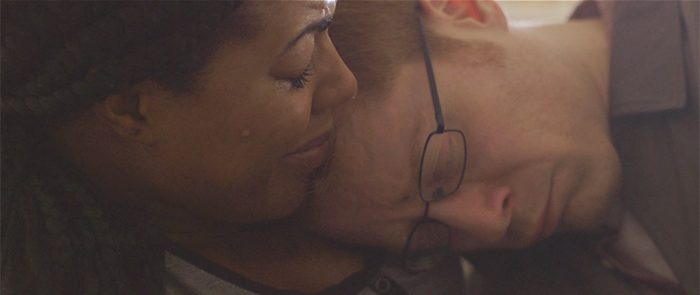
Breaking Glass Pictures
While press materials describes it as “a slow-burning LGBT thriller,” bwoy is more of a heartbreaking character study, a psychodrama really, with brief touches of suspense. Nevertheless, it’s purposefully challenging, skillfully understated and gets a mighty boost from its lead actors.
We open with shots of a beautiful little boy heading into a beautiful swimming pool. We think we know where things are going, and we’re pretty much on target, but director John G. Young (Parallel Sons, 1995) effectively establishes a timeless dread which looms over his story entire.
 Anthony Rapp (“Star Trek: Discovery,” Rent) is Brad, an early-forties employee whose call-center day job drains joy from him and he drifts through his after-hours life like a ghost. Young’s camera and pacing are sly in the early-going. We can’t immediately connect Brad with a solemn black woman (De’Adre Aziza) quietly intercut into his daily routine. Slowly, we come to realize Brad, who we’ve taken as gay and single, is actually married to the woman, Marcia. We take him as gay and single because he spends his evenings (and eventually, days) on a dating website seeking buff black men.
Anthony Rapp (“Star Trek: Discovery,” Rent) is Brad, an early-forties employee whose call-center day job drains joy from him and he drifts through his after-hours life like a ghost. Young’s camera and pacing are sly in the early-going. We can’t immediately connect Brad with a solemn black woman (De’Adre Aziza) quietly intercut into his daily routine. Slowly, we come to realize Brad, who we’ve taken as gay and single, is actually married to the woman, Marcia. We take him as gay and single because he spends his evenings (and eventually, days) on a dating website seeking buff black men.
Brad isn’t having any luck on the website until he spices up his profile, grabbing the interest of Yenny (Jimmy Brooks), a young, humorous and handsome Jamaican. Yenny comes on strong, but Brad is bowled over by the attention. Indeed Yenny has the gift of gab, a high-watt smile, six-pack abs and, let’s face it, who isn’t won over by a Jamaican accent? Yenny brings color to Brad’s gray life—literally: Young contrasts lush Jamaican landscapes and photos with the muted palette of Brad’s limbo life in Schenectady, New York.
Online chatting begets iPhone texting, which begets photo-sharing, which begets video conversations, which begets cyber sex. The progression is not unexpected. Befitting this era of social media excesses, much of the film consists of screenshots—phone and computers. Things are clearly presented through Brad’s point of view; when he’s offline, so is Yenny. Rapp never falters in building bland Brad out of quiet desperation. Stoic behind thin-framed glasses and a locked jaw, Brad often seems on the verge of tears or about to implode with embarrassment, convincing both in his willful naivety and risk-taking. Brad stereotypically targets muscular black men, has a black wife and yet his cultural examination seems to begin and end with search-engine image lookups and a CD of generic Jamaican jams. Is it pure lust, or revived hope that drives him forward, even as he begins to doubt Yenny’s intentions?
Marcia is key to the backstory. Broken and guilt-ridden into shocking submission, the deeply sad character is deserving of her own story. I’m of two minds concerning the handling of this subplot: the sparse development and dialogue between her and Brad speak to their devastating loss; it also seems undercooked, repetitiously vague. How much of this could Marcia really accept? Nevertheless, her quiet despair is devastating. Aziza is powerful in her final scenes with Rapp.
As the tragic past finally comes into focus, story proper has methodically guided us toward the inevitable in-person meeting between the online lovers. Now we flirt with suspense as Brad cuts free of the past that binds him and goes all-in for love. I expected a twist of “Catfish” proportions, but must admit I didn’t see a softer denouement coming. It certainly points us back to an understated theme of the potent pull of parenting.

| Marvin Brown’s Movie Review Archive
From the teachers in my youngest days to my wife who loves me despite my manly ways, and the village of grandmas, moms, daughters, aunts, cousins, niece, friends, coworkers, authors, veterans, athletes, doctors and ministers—a tapestry of powerful women have helped shape what I hope are the best parts of me. Thank you.
Get Out (2017)
Rated R
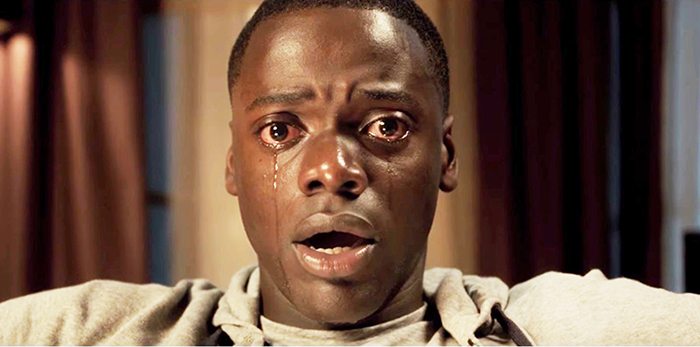
Blumhouse Productions
Get Out has the suspense, creepiness, violence and jumps scares one would want from a good horror film. Written and directed by Jordan Peele (half of the “Key & Peele” sketch comedy duo), the film’s also insidious with its coiling use of racial themes to enhance its effect.
A chilling opening sequence evokes the Trayvon Martin tragedy as we watch a young black man walking lost in the suburbs at nightfall. Peele immediately establishes a knack for tone and subtext. A character walking alone in the dark is a horror film trope, but certainly the specificity of a lone black man in a white neighborhood adds another dimension of dread to the scene. Notice, in quick, quiet cellphone dialogue, that the man knows how he looks and where he’s at invites danger.
 Next, we’re introduced to engaging interracial couple Chris and Rose (Daniel Kaluuya, “Black Mirror,” and Allison Williams, “Girls”) preparing for a weekend trip to Rose’s parent’s palatial estate deep in the exurbs. Rose seems nonplused that her mom and dad are unaware Chris is black; Chris is obviously more concerned about the oversight. Peele plays with racial notions of Rose’s privilege vs. Chris’ realistic concerns here, and in a later scene on the road when they are visited by a police officer. Rose doesn’t hesitate to cut into the officer for what she perceives is racist treatment of Chris, while Chris simply wants to deescalate a situation he’s likely experienced on more than an occasion. The opening sequence, police encounter and an accident en route cleverly set the viewer on edge even before the anticipated visit with the parents.
Next, we’re introduced to engaging interracial couple Chris and Rose (Daniel Kaluuya, “Black Mirror,” and Allison Williams, “Girls”) preparing for a weekend trip to Rose’s parent’s palatial estate deep in the exurbs. Rose seems nonplused that her mom and dad are unaware Chris is black; Chris is obviously more concerned about the oversight. Peele plays with racial notions of Rose’s privilege vs. Chris’ realistic concerns here, and in a later scene on the road when they are visited by a police officer. Rose doesn’t hesitate to cut into the officer for what she perceives is racist treatment of Chris, while Chris simply wants to deescalate a situation he’s likely experienced on more than an occasion. The opening sequence, police encounter and an accident en route cleverly set the viewer on edge even before the anticipated visit with the parents.
Said parents (Bradley Whitford and Catherine Keener) are welcoming in their liberal righteousness. Rose’s father, a successful neurosurgeon, declares he’d vote for Barack Obama for a third term if he could. Her hypnotherapist mother says all the right things but they land with a disingenuousness not lost on Chris. And what to make of Rose’s brother (Caleb Landry Jones, Antiviral), a disheveled rich kid quaking uneasily, speaking inappropriately, like he’s always on the verge of blurting out spoilers?
Back home, Chris’ best friend Rod (LilRel Howery), a TSA officer, is a Greek chorus of sorts, humorously braying about Chris’ naivety of race relations. But Chris—and the audience—isn’t naïve, simply hopeful for the best while laughing at Rod’s over-the-top rantings. You see, Rod says all the things black movie-goers say about white horror movies. He can smell a setup a mile away. Peele, working so effectively as a director of horror, here reminds us he made his bones in comedy.
Over the course of the weekend, Peele quietly but assuredly reels the viewer into a delicious web of paranoia. Suddenly, there’s an annual gathering of friends and family. The winding driveway his lined with black, expensive SUVs, the expansive lawn is a sea of gawking white faces. Chris’ and our time in exurbia grows curiouser and curiouser. His solo trips around the huge house and vast grounds bring unease. The way he’s regarded and how he reacts as the lone black man amongst throngs of old-money white people is a master’s class on how black folks navigate—sometimes moment to moment—competing worlds of racial divide. Chris’ intriguing hypnosis session with Rose’s mom—fantastically visualized as Chris floating in the cosmos with the real world hovering on a big screen TV just out of reach—sets the plot on a course not fully understood until the finale.
Most interesting is the portrayal of the other black faces Chris meets at the house. Every time he talks with or bumps into Stepford-like persons of color, Peele intrigues with the interactions—are they friends or foes, captives or themselves commanding some scheme? In this cauldron of supposed post-racial ennui, we nervously and giddily wait for the shoe to drop. Does Peele’s mixed-race heritage inform the proceedings? Perhaps. The film, in my view, knowingly winks at both sides of the racial coin. What an assured directorial debut!
If there’s a wobbly spot in an otherwise outstanding film, it’s a half-realized backstory concerning the death of Chris’ mother. The moment seems to exist mostly to justify an unlikely act of kindness late in the movie.
In the finale, with the curtains pulled back, the film burst with absurd conflict and straight-up horror and humor. The dangers are far afield from where we would have imagined, and yet with clever insight Peele suggests cultural appropriation is always hiding in plain sight.
This is the second “black” film in a row I’ve seen that, while presenting pointed issues on race, nevertheless with topical, effective storytelling and capable acting and directing taps into American commonality and manages to connect more broadly. Like Hidden Figures, this film seems to have admirers across the board.

| Marvin Brown’s Movie Review Archive
Hidden Figures (2016)
Rated PG
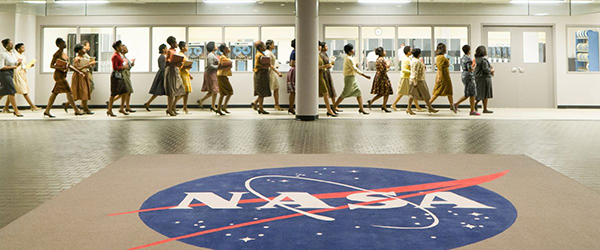
Levantine Films/Chernin Entertainment
That Hidden Figures rights a wrong by dramatizing the little-known history of brilliant African-American women, whose work proved instrumental in putting Americans into outer space, is enough to make this essential viewing. But I was surprised the film isn’t content to quit while it’s ahead.
 Directed by Theodore Melfi, the film also inspires and entertains with its unabashed appreciation of science and intelligence, and with the heady competition between the U.S. and the Russians to reach the stars—the space race. I was surprised again when it took another lap around the screenplay to explore the gender inequality of the era.
Directed by Theodore Melfi, the film also inspires and entertains with its unabashed appreciation of science and intelligence, and with the heady competition between the U.S. and the Russians to reach the stars—the space race. I was surprised again when it took another lap around the screenplay to explore the gender inequality of the era.
Figures even finds time, briefly but pointedly, for romance, parenting issues, and marital concerns, giving particular space to black men as providers for, supporters and admirers of these intelligent women. I love movies that celebrate intelligence and imagination. I reflect that despite the film’s risk of biting off more than it can chew, it succeeds because it’s well-written (from strong source material), directed and acted.
At so young an age, Katherine’s (Lidya Jewett) fluency with numbers grants her stamina and opportunities against the liabilities of her era: being black and female. Katherine G. Johnson’s beautiful mind ultimately leads her to NASA where as a widowed mother (now marvelously portrayed by Taraji P. Henson) she joins other black women with dazzling intellect (they are called human computers by their NASA bosses). It’s refreshing that the film takes their intelligence as a given. We know they’re smart, everyone in the building knows they’re smart, their families and friends know it too.
These women and others like them work in the far reaches of the intellectual caste—rocket scientists, physicists, mathematicians and engineers—yet they live in a time of segregated restrooms and eager suspicions. Katherine’s colleagues and carpool mates include Dorothy Vaughn (Octavia Spencer, The Help) and Mary Jackson (singer Janelle Monaé). The commute to and from work allows the women time to let down their hair and air grievances to each other.
Dorothy is a mathematician and supervisor in all but title, while Mary is an aspiring engineer, capable enough, but held back by her gender and race. Katherine’s undeniable gifts lead her to become the first “colored” woman on the Space Task Group charged with sending an American astronaut into space.
At work, it’s all business all the time, with little room for error, having at least as much to do with NASA’s exacting standards as it does the discriminatory practices of the day. Just as I’m wondering how such smart, analytical folks could waste time with petty, irrational racism, Kevin Costner’s hardnosed task force leader Al Harrison grows furious that his ace computer, Katherine, has to waste time daily running across campus to use the “colors only” restroom instead of the one right down the hall.
The women’s work intensifies with news that Russians have successfully launched a satellite into space—and then a cosmonaut. America’s history of being first, best, a global leader is on the line. The nation is stirred by the possibilities of touching the stars. It’s an era of racial shame, sure, but also a unique one in which astronauts (Ohio’s own, John Glenn!) were superheroes. At some point, the united cause to be the first nation to blast off the planet brings temporary racial reprieve. I’m reminded of how a champion sports team or Olympic squad can unite a city, state, nation of racially diverse people for the common cause of victory. The outcome of the space race might be celebrated history, but not the legacy of these amazing women. Their place in NASA and American history is equally impressive. The film gets that on the record.
The cast is a balancing act of great performances. The lead actors are, of course, exceptional—Henson and Spencer build on solid careers; Monaé emerges as a talent to watch. And note Kirsten Dunst’s (The Virgin Suicides) subtle but impactful portrayal of a tired subjugated white women who has more in common with her subjugated black subordinates than she can say. The men shine as well. Costner’s stern, all-business egghead never breaks character, but we find his humanity in the growing respect he gains for Katherine’s intellect and determination. Jim Parsons (TV’s The Big Bang Theory) gives a shaded performance as a mathematician growing bitter in the shadow of Katherine’s gifts, torn by his respect and jealousy. Mahershala Ali, who’s having a good year with this film and the acclaimed film Moonlight (which also features Monaé), is wonderful as a stereotype-busting upstanding veteran who pulls Katherine back to a long-abandoned world of romance.
Hidden Figures is entertaining, informative, a bit suspenseful and important. It’s rare to see a “black” film not involving sports that so personifies the American spirit. It’s hard to see anyone not finding elements that hook them into this outstanding film.

| Marvin Brown’s Movie Review Archive




